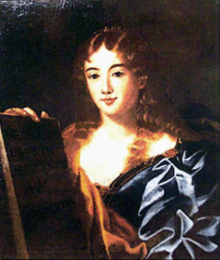Cvijeta Zuzorić
This article needs additional citations for verification. (March 2013) |
Flora Zuzzeri (Flora Zuzori) | |
|---|---|
 | |
| Born | c. 1552 Republic of Ragusa |
| Died | 1648 Ancona, Italy |
Flora Zuzzeri (pronounced [tsʋijěta zûzoritɕ]; also Fiora Zuzori or Flora Zuzzeri) (1552 – 1648) was a lyric poet from the Republic of Ragusa. She wrote in Italian, Latin and Croatian.[1]
Life
She was born in Ragusa, (now called Dubrovnik) into a prominent merchant family, she was the daughter of Frano Zuzori and Marina Radagli. Early in her childhood, she moved with her parents to Ancona, where she was educated.
In 1570, she married a Florentine nobleman, merchant, and diplomat Bartolomeo Pescioni who had been Florentine consul in the Republic of Ragusa. In the same year, the couple moved to Ragusa where they lived for thirteen years, until Pescioni's debts and bankruptcy stemming from his failed textile trade business forced them to move back to Ancona, where she died.[2]
Being a well-educated woman, she invited numerous authors and artists to her house, which was home to a widely known literary academy. Zuzorić was an exceptionally beautiful and intelligent woman, was said to have written excellent epigrams and gentle rhymes, most of which, however, have not survived. She is known only by reputation, since she was mentioned and celebrated in countless poems by Dinko Zlatarić, Miho Bona-Babulinov, Miho Monaldi, Boccabinco, Simonetti, Marin Bettera, her contemporaries, as well as later Ragusan authors.
She holds an important place in the historiography of Serbian Literature.[3]The 1928 Art Deco exhibition building in Belgrade is named Cvijeta Zuzorić Art Pavilion in her honor.[4]
She was mentioned in the sonnets of the famous Italian poet Torquato Tasso, who praised her virtues and beauty even though he had never met her. Her great friend Nikola Vitov Gučetić and his wife Marija Gundulić Gucić described her physical and spiritual beauty in his famous philosophical work on love, a treatise on the Meteors of Aristotle.
See also
- Republic of Ragusa
- List of notable Ragusans
- Dubrovnik
- Dalmatia
- History of Dalmatia
- Cvijeta Zuzorić Art Pavilion
Notes
- ^ Tomasović, Mirko (4 November 2009). "Još jedan cvijet u Cvijetinoj kosi". Vijenac (in Croatian) (409). Retrieved 30 August 2012.
- ^ Stipčević, Ennio (5 February 2015). "U glazbenom salonu Cvijete Zuzorić". Vijenac (in Croatian) (546). Zagreb: Matica hrvatska. Retrieved 9 January 2016.
- ^ http://www.politika.rs/sr/clanak/382345/Kultura/Cvijeta-Zuzoric-u-decembru-u-starom-sjaju
- ^ https://belgrade-beat.com/areas/kalemegdan
Sources
- Bloomsbury Guide to Women's Literature
- Slučaj Cvijete Zuzorić. Državni udar ljepotom (in Croatian)
- 1550s births
- 1648 deaths
- Croatian women poets
- Croatian women writers
- Ragusan poets
- 16th-century Croatian women writers
- 16th-century Croatian writers
- 17th-century Croatian women writers
- 17th-century Croatian writers
- Croatian salon-holders
- 16th-century Croatian poets
- 17th-century Croatian poets
- Croatian writer stubs
